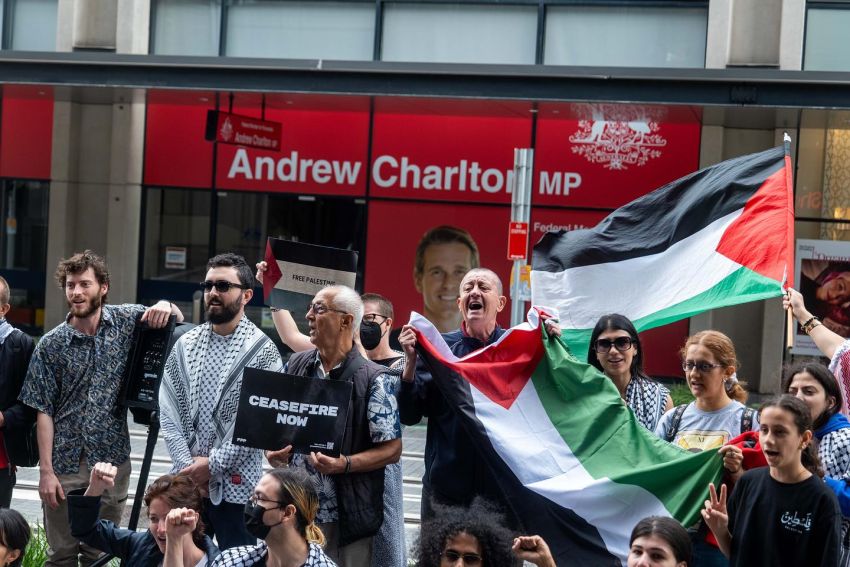
The Labor government is under significant pressure to move away from its total support for Israel’s genocidal war on the Palestinian people in the Gaza Strip.
After 20 weeks of national mass protests, some Labor MPs are talking about the need to demand a ceasefire and send humanitarian aid to the Gaza Strip.
They are concerned about Israel’s invasion of Rafah, the last remaining area in the Gaza Strip which has not been completely destroyed.
While Australia supported the last ceasefire motion in the United Nations General Assembly, its statement with the Canadian and New Zealand governments made it clear it only conditionally agrees: it says all the Israeli hostages must first be released.
Australia suspended funding to United Nations Relief and Works Agency (UNRWA) after Israel claimed some UNRWA staff were involved in the atrocities on October 7.
Even after a United States intelligence report admits there is a lack of evidence to support this claim, Australia has yet to resume its commitment to UNRWA.
Pro-Palestine demonstrations are continuing each week in major cities, despite calls from Zionists and conservative MPs for them to be banned.
The pro-Palestine movement is winning the hearts and minds of more Australians every day. Films documenting Israel’s war crimes are being shown, as well as other events supporting the Palestinians’ resistance are being organised across the country. Islamic clerics are supporting the Palestinian resistance, and some churches are offering prayers.
While some continue to try and brand the Palestinian resistance as “Hamas terrorism”, more are beginning to understand that resistance to the occupation is a right guaranteed under international law.
More than $15 million has been collected in aid for the Gaza Strip — a large amount from many quarters. However, only around $2.5 million has been sent to Gaza (according to estimates by someone who wants to remain anonymous).
The aid allowed through is classed as “family support”. However, the maximum allowed is not even enough to cover a family’s expenses for a week, as the cost of food has risen due to the Israeli occupation forces’ closure of all crossings.
Protests are being held to push councils, including Bankstown in NSW and Merri-Bek council in Victoria, to support a ceasefire motion. Many municipalities have refused, claiming it is outside their jurisdiction. They did not apply the same principles when they protested Russia’s invasion of Ukraine.
Campaigns to boycott Israeli companies supporting Israel, such as Zara stores, are also being organised. Various petitions have been submitted to parliaments and municipal councils, as well as federal, local and state government.
Activists are also meeting MPs to explain their dissatisfaction with the government’s position and to demand more political and financial support for the Palestinian people.
Labor has allowed every citizen with relatives in the Gaza Strip to apply for a visitor’s visa, and about 305 Australian-Palestinians have arrived.
The Australian government is feeling pressure from pro-Palestine MPs. Initially this was limited to the Greens, specifically Senator Mehreen Faruqi, however, it the Palestinian snowball is rapidly moving through the corridors of parliaments and now includes some Labor MPs.
A Friends of Palestine group has been set up inside Labor to call for an immediate ceasefire and an end to Israel’s war crimes.
Labor MPs who say they support Palestine must continue to fight to change federal and state Labor governments which do not.
The political challenge for Labor supporters of Palestine is to push for the party to support a comprehensive political solution, which goes well beyond changing MPs in a specific region.
Labor’s policy must recognise that Palestinians under occupation have the right to resist, including with armed struggle. It must include removing Palestinian armed factions from the list of terrorist organisations.
It also means demanding an end to: Israel’s siege of the Gaza Strip; Israeli settlements in the West Bank and East Jerusalem; and calling for the establishment of an independent Palestinian state including allowing Palestinian refugees the right of return.
This was the stated objective of the two-state solution, which has been blocked by Israel.
There must be some political gain from the current war, even if partial.
Palestinians are hoping that this will be the last genocidal war against us and that we will enjoy real and lasting peace and finally win a truly independent state.
[Khaled Ghannam is a Palestinian-Australian and is active in the movement for justice in Palestine.]